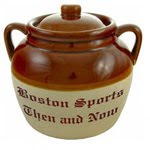When he left the Red Sox in 1998, I was only eleven years old. However, I remember staying up late at night watching the Sox play and I was always drawn to the screen when Mo Vaughn was at the plate. Though probably not true, it seemed like every Vaughn at bat would have him down two strikes to none before he belted one out of the park.
 |
| In eight years with the Sox, Vaughn batted .304 with 230 HRs and 752 RBIs |
Mo Vaughn, a Connecticut native, was beloved by not only my young self, but all of Boston. For a long time, he was the star of the Boston Red Sox slugging his way into the hearts of every sports fanatic across New England. However, as happens more often than not in sports, Vaughn and Beantown didn't leave on the best of terms.
Mo Vaughn, nicknamed "The Hit Dog", ended his 12-year career batting .293 with 328 home runs and 1,064 RBIs. He was drafted by the Red Sox in the first round (23rd overall) of the 1989 amateur draft. His major league debut came on June 27, 1991 against the New York Yankees. Though Vaughn would go 0-for-2 in the 8-0 Red Sox loss, he would soon lead Boston to many successes.
Vaughn started showing signs of things to come in his third year at the major league level, hitting 29 home runs and 101 RBIs. Then, in 1995, he became a force to reckon with. Vaughn's .300 batting average combined with 39 home runs, 126 RBIs and career-high 11 stolen bases earned him the American League MVP award. Though his great year led the Red Sox to the playoffs, they would lose to the Cleveland Indians in the American League Division Series.
Vaughn followed up his MVP season with a career year. In 1996, he hit a career high 44 home runs and 143 RBIs while batting .326. The year earned Vaughn his second straight trip to the All-star game but he finished fifth in MVP voting.
Mo Vaughn's production remained consistent over the next two years, his lowest batting average was .315 in 1997 and he hit as many as 40 home runs in 1998, which turned out to be his final year with the Red Sox.
 |
| Vaughn was a three time All Star and earned the American League MVP in 1995. |
Vaughn had surrounded himself with controversy and thus drew criticism. In 1997, he was accused of punching a 24-year old man, Scott Bird, in the mouth outside of a strip club in downtown Cleveland. He also had crashed his truck while returning home from a strip club in Providence, RI. Due to his rifts with the administration and off-field misconduct, when Vaughn became a free-agent following the 1998 season he did not re-sign with Boston. Instead, he almost immediately signed a six-year $80-million deal with the Anaheim Angels, which was the highest contract in baseball at the time.
Outside of Boston, Vaughn never had the same success. On the first play of his first game with the Angels, Vaughn fell down the steps of the visitor's dugout, which badly sprained his ankle. It was a moment that would exemplify the rest of his career, as his numbers would slowly tumble each year he was away from Boston. In December of 2001, the Angels traded Vaughn to the New York Mets in exchange for Kevin Appier, where he finished his career playing less than a month in his final season, 2003.
Even after his career, controversy still followed Vaughn. In 2007, the slugger was listed in the Mitchell Report, stating that Vaughn had purchased performance-enhancing drugs. The Mitchell Report listed Vaughn as purchasing HGH in 2001, apparently in an attempt to recover from injury on advice from his trainer.
Like many others, the steroids accusation tainted Vaughn's career and surely affected his hall of fame candidacy. Vaughn became eligible for the Hall of Fame in 2009, but received just 1.1% of the vote, knocking him off of the ballot and eliminating him from ever entering the hall.










No comments:
Post a Comment